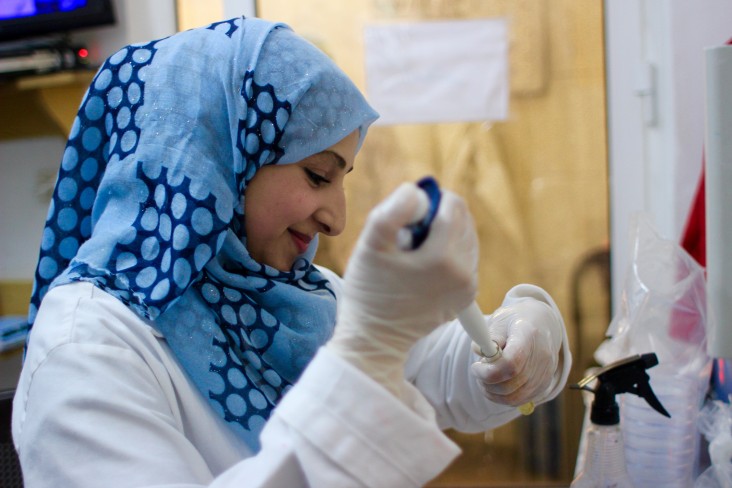Speeches Shim

August 2016—One of the greatest challenges facing the manufacturing sector in East Amman today is the retention of a talented, skilled workforce. Newly hired employees often arrive at the first day of work without the skills necessary to complete the three-month trial period for their employment, leading to increased hiring costs and declining productivity in companies.
To address this issue, USAID’s Workforce Development Project has instituted a vocational training and mentorship loyalty program in a number of factories, teaching the skills required to increase retention rates. Participants become well-versed in skills like teamwork, customer service and conflict resolution—skills necessary to maintain employment.
Areej Abu Safiah trained in the scientific stream in high school, earning a 90 percent average score. She went on to obtain her bachelor’s degree in laboratory science, only to find herself in a job with little opportunity for progression in either position or salary. When Abu Safiah moved on to find a similar job with more opportunities to grow and improve, she found that she still did not have the necessary skills to function in the workplace at her highest potential.
At the Alreem Al Nai Factory for dairy products where Abu Safiah works, she enthusiastically signed up for a training program for newly hired employees.
Prior to the training, Abu Safiah felt shy, had difficulty dealing with her coworkers, and was generally unhappy at work. Following the training, her relationship with her colleagues improved, and she became more optimistic and confident about her voice in the workplace.
“The training teaches us how to assess and deal with situations using real-life examples. There is always a way to solve problems,” she explained. “So I’ve already been able to apply what I have learned.”
The training has also improved Abu Safiah’s ability to assert herself and pursue professional goals.
“I often felt nervous when asking for more from my supervisors,” she said. The training program taught her and her colleagues how to portray themselves as trustworthy employees and valuable assets to the company. “I feel more attached to my work. I want to continue working here to become the manager of the lab,” continued Abu Safiah.
The training touched every aspect of her life. “Working in a place that encourages me to excel will make me rethink my career,” she said. “Retention means that I have the fertile soil to develop professionally and feel secure enough at my workplace, which will help me achieve my goals. I am the new Areej now. I am a good stress handler, adaptive and flexible and, most importantly, a future leader.”
Abu Safiah advises new employees to retain their jobs and always make an effort to improve themselves, knowing that managers will eventually notice. “Once you enroll in such a training program, you will definitely change gear in your career strategy, just the way I did,” she added.
USAID’s Workforce Development Project in Jordan, which runs from 2014-2019, is designed to increase private sector employment, especially for women, youth and those living at or below the poverty line. To date, the project has successfully placed more than 300 Jordanians in new jobs in the food production, clean energy and garment sectors and launched eight public-private partnerships to create job placement and improve employee retention.
LINKS
Follow @USAIDJordan, on Facebook, on Flickr, on YouTube

Comment
Make a general inquiry or suggest an improvement.